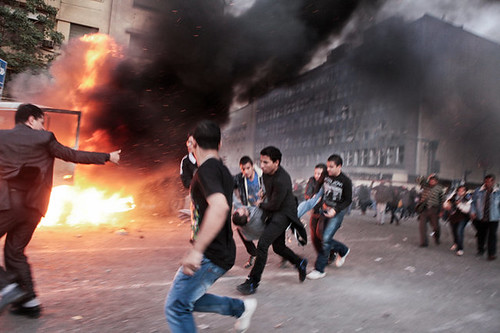
Police attacked demonstators in Cairo after they had set up camp in Tahrir Square. Thousands had demonstrated calling for the end of military rule in the North African state., a photo by Pan-African News Wire File Photos on Flickr.
November 27, 2011 8:30 pm
Thousands protest in Cairo ahead of poll
By Heba Saleh in Cairo
Financial Times
Tens of thousands of Egyptians demonstrated in central Cairo on Sunday calling for the ruling military council to step down, in a deepening political crisis that has overshadowed Monday’s parliamentary elections – the first post-Arab spring poll and a crucial step on the route to democracy.
Piling the pressure on the generals, Mohamed ElBaradei, the Egyptian Nobel laureate and opposition leader, announced he was prepared to form a caretaker “national salvation government” and give up his ambitions to run for president.
Protesters camping in Tahrir Square for a ninth day want the military council headed by Field Marshall Mohamed Hussein Tantawi to cede power to a credible government of civilians, possibly led by Mr ElBaradei.
He is supported by many young activists who describe him as “Tahrir Square’s” chosen prime minister because he has been a consistent critic of the council’s handling of the transition, and of their revival of the authoritarian practises of the Mubarak era.
Mr ElBaradi’s backers say he possesses the stature to stand up to the generals and to guide a genuine transition towards democracy.
Kamal Ganzouri, a 78-year-old former prime minister brought out of retirement by the army council to lead a new government has been rejected by protesters, but the military council urged politicians on Sunday to back him.
“The military are only seeking to patch up Mubarak’s regime,” said Khaled Abdel Hamid, a political activist. “These protests are about getting rid of the regime – something that won’t happen through elections.”
Some 50 parties and more than 5,000 candidates are competing in the complex election which will take place in stages over six weeks. Few results are expected in the early stages of the election. Under Egypt’s complex electoral rules, two-thirds of the seats in the assembly will go to candidates on party lists competing under a proportional representation system. The electoral commission said those results would only be announced at the end of the six-week process.
Another round of staggered voting will follow next year to select members of the upper chamber of parliament. Both elected assemblies will oversee the drafting of a new constitution.
The Freedom and Justice party, the political arm of the Muslim Brotherhood, is expected to emerge with the largest bloc of seats in the new assembly though probably not a majority. Fearful of imperilling the poll, it has distanced itself from the protests arguing that only elections can hasten the departure of the generals.
“There is no alternative to the military council now,” said Saad al-Katatny, a Freedom and Justice spokesman. “We have to take the first step and go to elections and then see what we can do.”
Mr Tantawi warned on Sunday that the country was at a crossroads. “There are only two routes, the success of elections leading Egypt towards safety or facing dangerous hurdles that we in the armed forces, as part of the Egyptian people, will not allow,” he said.
Two main groupings of liberal parties and young activists who had joined forces to fight the election also called on Sunday for the poll to be postponed by two weeks until a new government was in place.
They criticised the choice of Mr Ganzouri as prime minister and urged the formation of a national salvation government endowed with full authority to restore security, revive the economy and prepare for the elections.
At least 42 people were been killed and hundreds injured in six days of clashes this month in which police used teargas, buckshot and at times live ammunition, sparking calls for the downfall of the country’s military rulers.
No comments:
Post a Comment